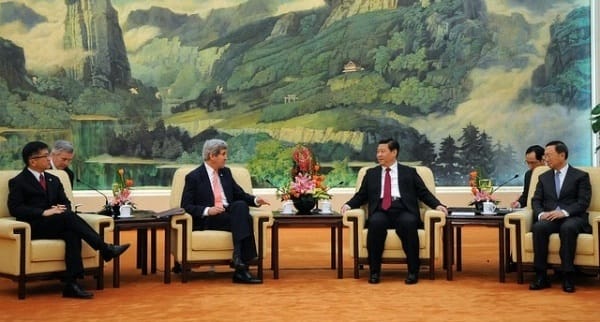Beginning last Thursday, US Secretary of State John Kerry met leaders in Seoul, Beijing and Jakarta. The US invoked its “pivot to Asia” again after being distracted by the Syrian conflict. It was an important visit, but one that left much to be desired. No one expected Mr Kerry to produce a breakthrough solution to the maritime disputes in Asia. But disappointed observers drew attention to his gaffes made at press conferences during the visit, such as his seeming inability to differentiate the Dokdo/Takeshima islands from the Diaoyu/Senkaku islands.
International interest turned instead to Mr Kerry’s visit to Jakarta – and rightly so – where he delivered a key speech on climate change. There, he described climate change as “perhaps the world’s most fearsome weapon of mass destruction”. Indonesia is the world’s third largest emitter of greenhouse gases, after China and the US, in that order. Deforestation in Indonesia is the main problem, though the growing demand for cheap electricity from coal-fired power plants is another.
Without cooperation between these three countries in committing to carbon cuts, international efforts in combating climate change would surely be futile. One stumbling block is that China and Indonesia naturally resent being lectured at by the US on climate change. Therefore, Mr Kerry’s announcement that the US would contribute US$332 million (S$420 million), through the Green Prosperity programme, to help Indonesia tackle deforestation and support clean-energy projects would certainly be welcomed.
In Beijing, the US has agreed to a partnership with China in sharing information and policies to help develop plans jointly. US-China cooperation on climate change seems to have made progress since the 2009 Copenhagen climate-change negotiations and since the Obama administration launched its own plan to tackle climate change.
Joint research on low-carbon technologies is already being undertaken by the two countries. But the question remains as to how such research can transform their economies and overcome the fundamental policy differences between them. The reality is that, despite its pledges, China has not taken on its fair share of reducing emissions as much as the US. On its part, the US should also be cognisant that its consumers have an astounding demand for Chinese goods, which indirectly contributes to climate change.
US-China cooperation on climate change can help minimise the gap and mistrust between the global North and South. A strong partnership would send a strong message to developing and developed countries. To do that, however, Washington and Beijing must first build on improving mutual trust and communication.
Sources:
John Kerry’s Bumbling Performance Regarding East Asia [Cato Institute, 18 Feb 2014]
Assessing John Kerry’s Visit to Jakarta [Council on Foreign Relations, 17 Feb 2014]
Photo Credit: US State Department (public domain)




